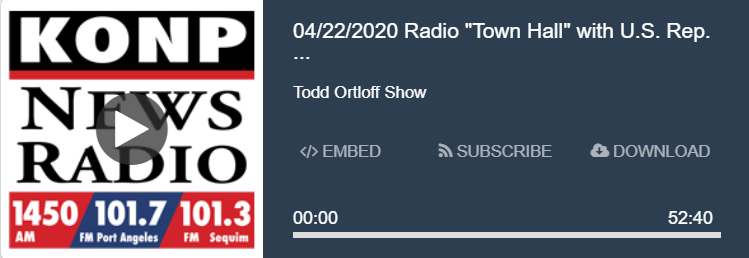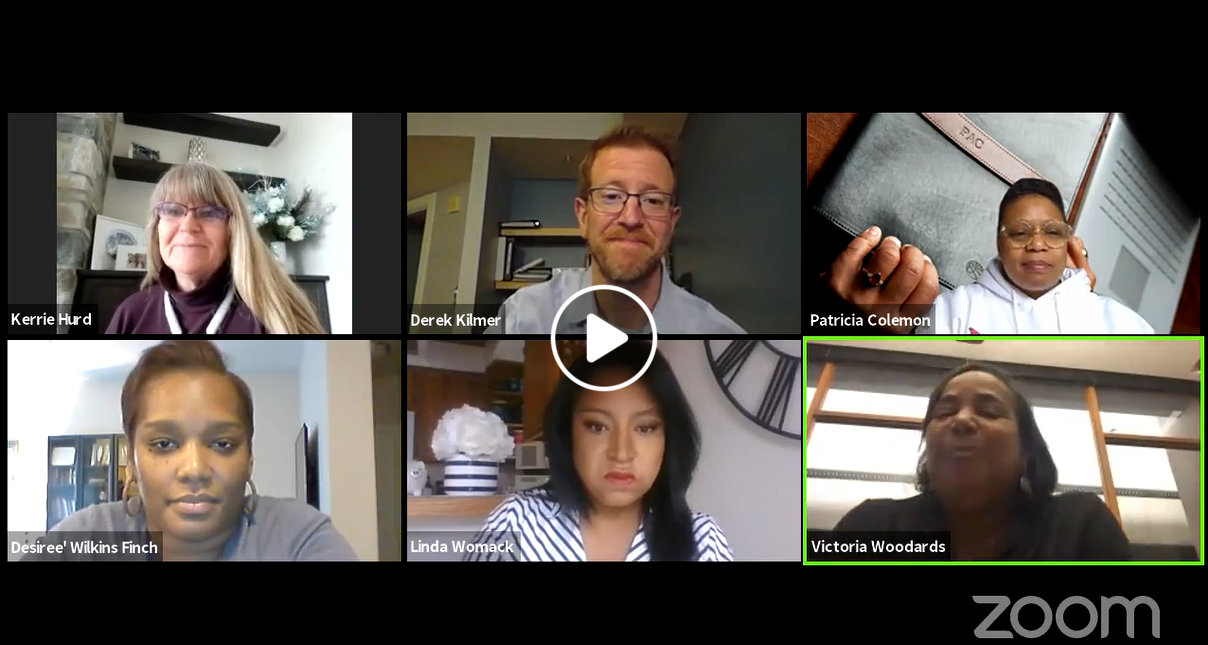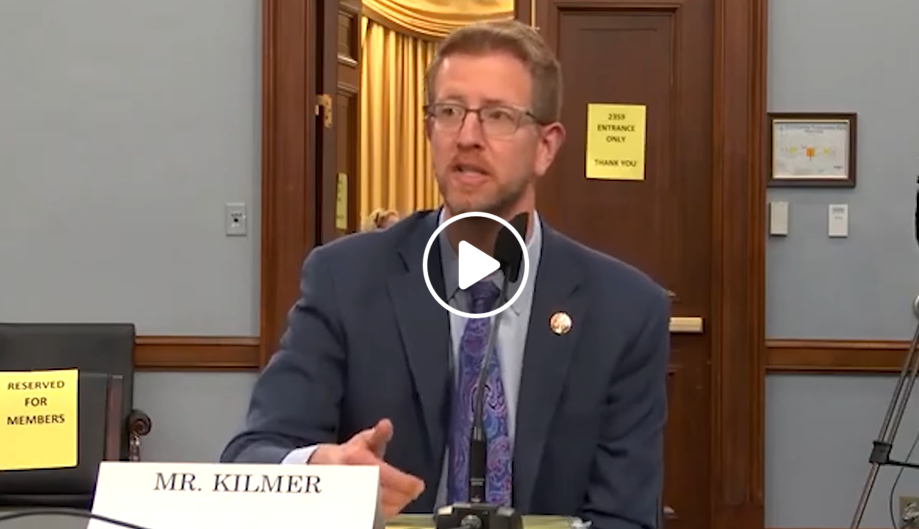Providing Support for Our Small Businesses and Frontline Workers
Hello Folks –
I hope you are all hanging in there. It’s been a challenging week for our region, but Washington is making real progress in containing the spread of the coronavirus (COVID-19). While there is certainly more work ahead, the work folks are doing to stay home and stay healthy is making a difference.
Now - the news!
Fighting for Our Local Employers
As I recently wrote in The Kitsap Sun, small businesses are the backbone of our economy – creating over 60 percent of new jobs in the private sector on Main Streets throughout our country. Right now, as our nation works to contain the spread of COVID-19 and save lives, small businesses are hurting.
That’s why the CARES Act included funding for programs to help small businesses and their workers get through the crisis. These programs include Economic Injury Disaster Loans to keep small businesses going – with a portion of that loan being a grant that does not have to be repaid – and the Paycheck Protection Program (PPP) to help employers keep their workers on payroll. Those who get funding through PPP don’t have to pay the money back so long as they hang on to their employees.
But these programs have had a rocky roll out, and it is clear that more funding is needed. That’s why I wrote to the Administrator of the Small Business Administration (SBA) expressing the need for them to do better in helping small businesses and the lenders that serve them navigate this crisis.
In addition, this past week, I voted to support the Paycheck Protection Program and Health Care Enhancement Act to deliver additional assistance to Washington’s small businesses. This legislation provides $310 billion for PPP and takes steps to ensure access to this assistance for many small businesses in underserved rural and urban areas. Among other things, the bill required some of the funding to flow through small community banks and credit unions in hopes of getting assistance to local employers that were left out in the first round. It also expands small business support beyond the PPP program by investing $50 billion for SBA disaster lending, translating into more than $350 billion in loans, and $10 billion for SBA disaster grants.
But there’s more work to do.
That’s why last week I testified in front of the House Small Business Committee to urge congressional leaders to build a comprehensive strategy to help small businesses. In my view, that strategy should include my bipartisan PPP Extension Act to continue to significantly expand the PPP program and ensure every qualified small business can get the help it needs. In addition to delivering help to small businesses facing challenges now, I think the federal government should be planning for the future – and I’m advocating for an assistance system based on automatic triggers that would kick in if economic conditions remain dire and provide additional help when it is needed, where’s it is needed. You can watch my testimony by clicking the video below.
Last week, I also introduced the Restore America’s Main Street Act to deliver immediate and unrestricted relief to our nation’s smallest small businesses through a first-ever small business rebate check. Under this bill, small businesses with $1.5 million or less in gross receipts and 50 or fewer employees would receive a rebate check equal to 30 percent of the gross receipts reported in the previous year (up to $120,000). Self-employed individuals and certain charitable organizations would also be eligible for the rebate. This rebate will help our nation’s small businesses retain employees, pay critical bills, and keep the lights on.
I’ll keep fighting for Main Street employers and workers as we work to contain the spread of the coronavirus and reopen our economy when it is safe to do so.
Supporting Frontline Health Care Workers & Calling for More Testing
In addition to helping our small businesses, the Paycheck Protection Program and Health Care Enhancement Act that I voted to support last week – which has now been signed into law by the President – provides $75 billion for hospitals and health care workers. Given the costs of ramping up to deal with this pandemic and the cancellation of elective procedures, our hospitals have really felt a financial strain. This bill should help with that. In addition, some of the funding is focused on meeting such needs as Personal Protective Equipment (PPE). If this is – as the President has said – a “war against a hidden enemy,” then our frontline health care workers are our soldiers. America should never let our soldiers go to war without the equipment they need. This bill will ensure the federal government steps up to deliver more PPE and support our health care providers.
The bill also included $25 billion to expand COVID-19 testing. The nation’s public health experts agree that testing is the key to reopening the economy and resuming our lives. Last week’s bill requires the establishment of a national strategic testing policy that will focus on increasing domestic testing capacity and ensuring the availability of testing supplies.
The lack of federal coordination around testing simply needs to be addressed. With that in mind, last week, I led over 55 Members in calling for the implementation of an evidence- and science based National Recovery Strategy that prioritizes continued mitigation and containment of COVID-19 alongside efforts to reopen the economy in future coronavirus response and recovery legislation. As part of this strategy, Congress should ensure all communities have the ability to (1) rapidly test every symptomatic case or those suspected to be exposed; (2) perform widespread surveillance and serological testing and understand how these tests can be used; and (3) trace all contacts of known cases.
I’ve also signed-on as an original cosponsor of the Immediate COVID Testing Procurement Act to leverage the Defense Production Act to procure all necessary components and supplies to conduct molecular and serological COVID-19 medical testing nationwide. We cannot – and should not – rely on other countries for these critical supplies. It’s time to ramp up our capacity to address this here in the United States.
I’ll keep working to ensure our communities have the ability to reduce, contain, and track this virus so we can save lives and eventually take steps to re-open the economy.
Ensuring Your Dollars Are Spent Wisely
Given the substantial federal response to this public health crisis and this economic crisis, it’s absolutely critical that tax dollars are spent efficiently and effectively. These emergency relief bills have been costly, and America can’t afford for dollars to be wasted. Lives and livelihoods are at stake.
With that in mind, last week, the House voted to establish a new House Select Committee on the Coronavirus Crisis. This committee will be tasked with ensuring that taxpayer dollars are spent wisely – rooting out waste, fraud, and abuse and protecting against price gouging and profiteering. The committee will be focused on ensuring that the federal response is based on the best possible science and guided by our nation’s leading health experts.
At the beginning of World War II, then-Senator Harry Truman created a Special Committee to prevent waste and ensure accountability. That committee, which cost less than $1 million, saved nearly $15 billion by preventing fraud and abuse. Truman later said, “I knew that after the First World War there’d been a hundred and sixteen investigating committees after the fact, and I felt that one committee before the fact would prevent a lot of waste and maybe even save some lives, and that’s the way it worked out."
I am hopeful that this new bipartisan House Select Committee on the Coronavirus Crisis will help save lives, deliver relief, and benefit our economy.
Working for You
Answering Your Questions
Last Wednesday, I joined the Todd Ortloff Show on Newsradio KONP in Port Angeles for a town hall on the coronavirus. Clallam County Health Officer Dr. Allison Berry Unthank and I answered questions from folks across the region about the federal, state, and local response to the coronavirus – and where we go from here. You can listen to the full conversation here.

Helping Those in Need
From Grays Harbor to Bremerton, Port Angeles to Tacoma, our social service providers are pillars of our community - delivering critical support and care to thousands in our region as we work to contain the spread of the coronavirus. I hosted a conference call with providers from across our region to hear firsthand about the resources they need, and how I can ensure the federal government steps up to be a better partner.
Providing Resources for Our Minority-Owned Small Businesses
Our region’s small businesses are the backbone of our economy - and minority-owned businesses are key contributors to our economic vitality. As we work to contain the spread of the coronavirus, our small businesses are facing unprecedented challenges. Last Wednesday, I hosted a Facebook Live Q&A with Tacoma Mayor Victoria Woodards and representatives from the U.S. Small Business Administration, the Minority Business Development Agency, the Tacoma Urban League, and Sound Outreach to talk about the critical resources available for minority-owned small businesses – and to answer a number of questions from local employers. You can re-watch our chat here.

Checking-in with Our Education Systems
Last week, I spoke with school superintendents from across our region about how our education systems are coping with the coronavirus and transitioning core curriculum to distance and remote learning. They’re providing tremendous leadership in the face of adversity. I’m grateful for their partnership.
Ok – that’s it for now folks. If there’s anything I can do to help you or someone you care about, please don’t hesitate to get in touch with my office.
Take care of yourselves – and each other. As always, I’m honored to represent you.
Sincerely,
Derek

